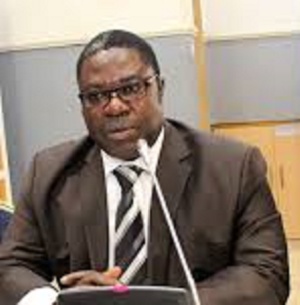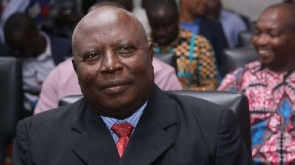- Home - News
- TWI News | TV
- Polls
- Year In Review
- News Archive
- Crime & Punishment
- Politics
- Regional
- Editorial
- Health
- Ghanaians Abroad
- Tabloid
- Africa
- Religion
- Election 2020
- Coronavirus
- News Videos | TV
- Photo Archives
- News Headlines
- Press Release
General News of Tuesday, 5 February 2019
Source: ghananewsagency.org
Full implementation of AfCFTA expects to increase trade
Mr Tei Konzi, Commissioner in-charge of Trade and Free Movement at the Economic Community of West African States (ECOWAS), has said it is expected that trade among African states will increase to 52 percent, valued at about US$ 35 billion by 2022, when the African Continental Free Trade Area agreement comes to reality.
He said 91 percent of Africa’s export trade with the rest the world was only six percent of global trade volumes adding that “trade among member African states was the way to go.”
Mr Konzi was speaking at a workshop organised by the United Nations Economic Commission for Africa (UNECA) Sub-Regional Office for West Africa (ECA-SRO WA) for members of the Network of Economic Journos on Africa Continental Free Trade Area (AfCFTA) in Monrovia, Liberia.
The three-day workshop was held to deepen the understanding of journalists on the AfCFTA to support advocacy actions for ratification and implementation as well as to disseminate information on the subject matter as widely as possible.
Mr Konzi said increasing trade volumes among member states has many advantages and urged all stakeholders to come on board.
He said majority of the signatories, who have appended their signatures to the AfCFTA agreement-12, are in ECOWAS states including Ghana, Togo, Liberia.
Of the number, eight countries have ratified the agreement with three including Nigeria, Benin and Guinea Bissau, yet to sign.
A total of 48 countries out of 54 countries have signed the AfCFTA agreement but needed 22 member states to ratify the agreement to make it operational.
Mr Konzi said the implementation of the AfCFTA would accelerate borderless environment merging all homes, infrastructure, investors and investment as well as institutions together to better fight poverty, disease and hopelessness.
He said innovation in the AfCFTA means a dialogue with private, public partnership anchored on civil societies and highly alert media holds the key for a smooth transformation and implementation of the agreement.
Mr Wilfred Banguru, Deputy Minister of Administration, Ministry of Commerce and Industry, expressed the hope that the workshop will boost the development of a responsible and robust partnership with the Network of Economic Journos for improved visibility and dissemination of information and issues relevant to the sub-region for economic and social development.
“We hope that the objectives and expected outcomes from the meeting would be actualized as we support and assemble all resources for the success of the AfCFTA and ‘Africa we want.’”
He said practically, Liberia has assessed the economic viability of the sub-region and has recognized and deployed the appropriate legislation backed by genuine policy frameworks as trade is impeded by barriers that needs to be collapsed through partnerships as envisaged by the agreement.
He said the advantages of trade grouping together would eradicate the current phenomenon of young people sojourning through the desert trying to reach out to Europe and the mediterranean area but die in large droves.
Mr Dosso Bakary, Acting Director of ECA-SRO WA, said the assembling of Network of Economics Journos would broaden knowledge on the AfCFTA, increased internal dynamics for negotiations, integration and implementation giving better visibility for the African Development Agenda in tandem with the African Union/United Nations agenda 2030 in line with the Sustainable Development Goals.











